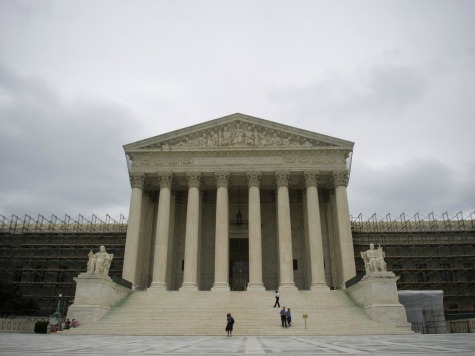
The year 2013 was an important one at the U.S. Supreme Court in the life of this nation, coming on the heels of another blockbuster year in 2012. Breitbart News offers a perspective on the Court’s year in review.
Supreme Court Terms start on the first Monday of October and go until the end of June. So the first half of 2013 saw the Court hand down decisions in some big cases, many of which started at the Court in late 2012. Here are the highlights:
-
On Feb. 29 in Clapper v. Amnesty International, the Court decided whether media and human-rights organizations have standing under Article III of the Constitution to sue over foreign surveillance programs operated by the U.S. government, when none of them can make any showing that any of these groups were ever monitored. The Court held 5-4 that it would violate a key limit the Constitution puts on the federal courts to hold that the plaintiffs have standing, since plaintiffs must demonstrate a concrete injury that was caused by the defendants and that courts could remedy.
-
On Mar. 26 in Florida v. Jardines, the Court held 5-4 that it violates the Fourth Amendment if police use a drug-sniffing dog on a porch to detect drugs inside a house. This majority was comprised of the most conservative justices with the most liberal, with the more moderate justices dissenting.
-
On June 3 in Maryland v. King, the Court held 5-4 that it does not violate the Fourth Amendment to use a cotton swab to collect DNA from a person who has been arrested, though the Court had previously held on Jan. 9 in Missouri v. McNeely that a warrant may be required to draw blood by needle to check alcohol levels, although the justices split several ways on why the Fourth Amendment required a warrant in that situation. Justice Thomas held that neither procedure requires a warrant, while some liberal justices argued that both require a warrant.
-
On June 17 in Arizona v. Ariz. Inter Tribal Council, the Court held 7-2 that states cannot require proof of citizenship when a person uses a federal form to register to vote unless the federal government allows it. Justices Thomas and Alito dissented, arguing the Constitution empowers states to decide the matter.
-
On June 24, the Court decided Fisher v. Univ. of Tex, challenging that school’s racial-preference program for admissions. The Court reaffirmed that the Fourteenth Amendment to the Constitution only permits government to consider race if it satisfies strict scrutiny: the government must prove that the law is precisely tailored to achieve a truly compelling public interest. The Court held 5-4 that the lower court was far too deferential to the university, and sent the case back for the court to apply a scrutiny that is truly strict.
-
On June 25, the Court held 5-4 in Shelby County v. Holder that the formula Congress uses to require some states–mostly in the South–to obtain approval from the U.S. Justice Department before changing their voting laws is no longer rationally related to any modern evidence of racial discrimination, since the data Congress used was from the 1960s and ’70s, and struck down Section 3 of the Voting Rights Act. Justice Thomas argued that the Court should go further, striking down the entire Section 5 preclearance system as outdated, not just the formula Congress uses to impose it.
-
On June 26 in U.S. v. Windsor, the Court held 5-4 that the federal Defense of Marriage Act, defining marriage between a man and woman in federal law, was utterly irrational, and the bipartisan supermajority of Congress that passed it–as well as President Bill Clinton who signed it–were motivated purely by fear, ignorance, and bigotry. The conservative justices dissented on multiple grounds.
-
On that same day in Hollingsworth v. Perry, the Court held 5-4 that when California officials refused to defend the California Constitution in court, no one could step into those officials’ shoes to litigate on behalf of the state. Consequently, the Court could not consider the challenged provision of the California Constitution defining marriage as one man and one woman and thus did not reach the issue of whether the U.S. Constitution includes a never-before noticed right for adults to marry anyone they wish, which would create a right to homosexual marriage and likely polygamy as well.
Since the Court’s 2013 Term began in October, the Court has heard new cases on various other constitutional issues, from public prayer, to whether treaties give Congress power denied to it under the Constitution, to another racial-preference case, to the limits of the EPA’s power.
The Court has not yet decided any of those big cases. There are more newsworthy cases scheduled to be argued in the next few months. On New Year’s Day, Breitbart News will publish a follow-up report on what to expect from the Supreme Court in 2014.
Ken Klukowski is senior legal analyst for Breitbart News. Follow him on Twitter @kenklukowski.

COMMENTS
Please let us know if you're having issues with commenting.